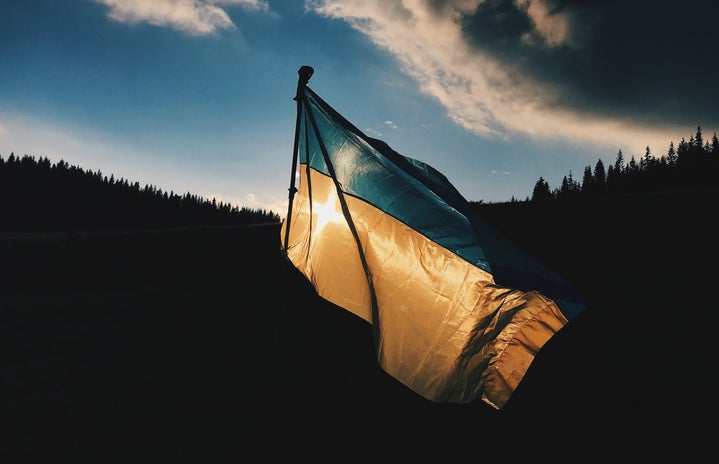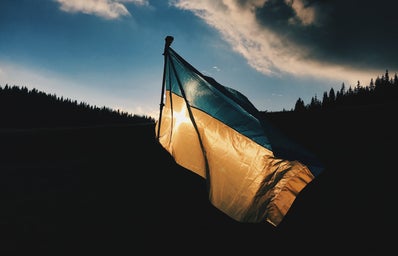By now, the news of the crisis between Ukraine and Russia has spread across the world, and with it, different reactions. Some are meeting this brutal invasion with humor about WWIII, some are choosing to denounce it for the true crisis that it is, and some are experiencing debilitating panic. With each of these approaches, misinformation is spreading like wildfire and drawing attention away from the unimaginable fear and distress that Ukrainian civilians are facing. In light of that, here is what’s happening in Ukraine.
One of the most important factors in understanding this crisis is first realizing that these conflicts are not new or without meaning. Dating back to when Ukraine was under Soviet rule until 1991, it was classified as a Soviet republic and because of this, it has immense cultural and economic ties with Russia. Since then, Russia has attempted to regain control of what they view as their territory. Although, in the past eight years, the conflicts between the two countries have grown. In 2014, while a revolution removed the pro-Russian president and replaced him with pro-Western democratic figures and institutions, Russia took advantage of the political turmoil and began to establish military control over Ukraine’s southern Crimean peninsula. This annexation was met with widespread condemnation from world powers, and Russia faced Western sanctions. Russian authorities began to repress local Ukrainian and Crimean Tatar activists and instigate rebellions. As Ukrainian troops tried to re-establish control, President Putin decided to send regular army units to support the Russian attempt. This recent war killed thousands of people, and though it formally ended in 2015, the conflicts at hand have not been forgotten or resolved by either country.
In the past few months, relations between the two have once again escalated. There were early reports of a large number of Russian troops and the preparation of infrastructure along Ukraine’s borders in late 2021, and while Ukraine spoke of possible invasions, Russia assured the public that it was simply for military exercises. With these assurances, Russia began demanding limitations of NATO’s dispensing of weapons to member states, military cooperation in post-Soviet states, and further eastern expansion. Weeks after these demands, Russia launched what is being referred to as a “full-scale invasion” in Ukraine, creating the start of one of the biggest conflicts to take place on European land in decades. The Ukrainian Minister of Foreign Affairs, Dmytro Kuleba, initially announced that this was a problem solely between the two states, but the High Representative of the European Union for Foreign Affairs and Security Policy, Josep Borell, accurately stated that this concerned the entirety of Europe. More than that, it involves virtually every country in the world due to alliances, resources, economic policy, and more.
It is imperative to note that while this conflict has a long history, this particular approach to a solution was only pursued by Russia. Ukraine, the EU, the U.S., and more world powers condemned any military action and pleaded for discussion and negotiation. Many people do not understand why this is happening now. The simple answer is that Ukraine is seeking membership in NATO, which Russia strongly opposes for several reasons. Putin largely opposes this because he views it as hostile towards Russia and a sign of mistrust from the West. Many speculate that this point of view is largely impacted by the fall of the Soviet Union and the decades of “humiliation” that followed.
On February 24th, 2022, Russia began invading Ukraine by first crossing its borders, followed by a series of airstrikes around the country, but mainly focused on Kyiv, the capital of Ukraine. Since then, both the lives of civilians and soldiers have been lost, abandoned subway stations are being used as bomb shelters, hundreds of thousands of people have fled the country, the Ukrainian President is calling anyone who will fight to the country, and Russia seems to have no intention of stopping. Taking place on Monday, February 28th, Ukraine and Russia delegations are meeting at the Ukrainian-Belarusian border to discuss a “diplomatic” solution to the crisis at hand. Meanwhile — as the war continues to spread throughout Ukraine — Putin has requested nuclear arms to be placed on high alert in anticipation of this meeting. . Many are optimistic that this discussion will lead to some solution and that Ukraine will get justice while Russia will retreat. However, many are still unhopeful that this meeting will result in anything less than escalating the war and the territory wanted by Russia.
Currently being a student in Europe, the learning and everyday environment has shifted in major ways since the invasion began. With only one country separating Bulgaria from Ukraine, tensions are high. For American students, the view on the topic is split. Some have no concern over it as they are not involved, while others are meeting with advisors and professors, checking the news every hour, and preparing to be sent home and/or stuck in Bulgaria without access to some resources. Professors and staff of the university are advising students to pull hundreds of leva, the Bulgarian currency, at a time because lack of access to ATMs would be one of the first implications of this crisis; hotels in Varna and Sunny Beach are providing thousands of beds to Ukrainian refugees; Bulgaria has announced that they are cutting ties with Russian flights. As of right now, other than potential lack of resources, the biggest concern about this crisis for Bulgarians is the fact that their country borders the Black Sea; the initial territory Russia wanted from Ukraine is a peninsula in the Black Sea, and they have since been occupying more islands off the coast of Ukraine and Romania. While there is no clear intention or indication that Russia will attempt to gain control of the coastline, there is a great possibility.
One of the most difficult aspects of attending an international school is seeing the reactions of students from different countries all being affected by this crisis. Many of my classmates are Ukrainian, some of which are attending classes virtually, and it has been challenging to see if they will even attend class. Students from countries that border Ukraine have the strongest reactions — not only because of proximity — but also because of the recent history of Soviet rule: calling their families as they wonder if Russia will invade their countries, wondering how they will get home if the flight paths are blocked, and whether or not they will even address the crisis at hand. While the majority of students are experiencing some kind of fear and panic regarding the situation, we also acknowledge that we are feeling just a fraction of the emotions that Ukrainian students and civilians are facing.
In the coming days, we can hope for the best regarding the upcoming meetings and continue to support Ukraine as a whole. Apart from donating and keeping everyone involved in mind, one of the most important things to do is be educated about the crisis as it evolves. Linked below are verified sources in which anyone can donate to the country’s citizens and support them with basic necessities and access to medical and psychological services. The below sources are provided by the faculty, staff, and students of the American University in Bulgaria.
Links:


